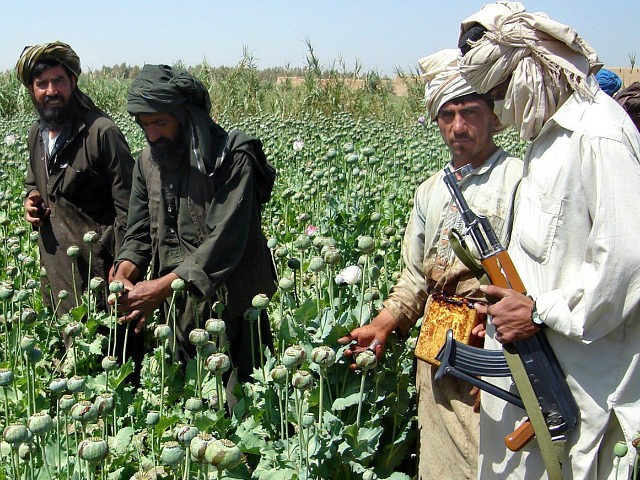The Obama administration, citing “political concerns” in 2013, derailed a plan to prosecute Taliban drug kingpins in U.S. courts that could have curtailed unprecedented heroin operations in Afghanistan that fueled the deadly opioid crisis across the United States, a Politico investigation found.
Identified as Drug Enforcement Administration (DEA) agents and U.S. Department of Justice (DOJ) legal advisers at the time, the authors of the plan, code-named Operation Reciprocity, told Politico, “The real reason it was shut down was fears it would jeopardize the administration’s efforts to engage the Taliban in peace talks and still-secret prisoner swap negotiations involving U.S. Army Sgt. Bowe Bergdahl.”
Last year, Bergdahl pleaded guilty to desertion and misbehavior before the enemy after being exchanged by the Obama administration for five high-risk Taliban commanders in 2014, including at least some believed to have returned to terrorist activities.
Citing interviews with current and former officials familiar with the plan to indict Taliban heroin kingpins as well as a review of government documents and congressional records, Politico published a long expose on Sunday, revealing that the Obama administration “shut down” Operation Reciprocity in 2013.
On May 27, 2013, U.S. Ambassador Tina Kaidanow from the U.S. Department of State reportedly issued a “stand-down order” to the American officials involved in carrying out the plan to indict Taliban heroin traffickers. Kaidanow served as State’s deputy chief of mission in Kabul under the Obama administration.
Politico found that Kaidanow — currently the State Department’s principal deputy assistant secretary for political-military affairs — “didn’t recall” shutting down the operation.
Nevertheless, she reportedly noted that “if she did issue such an order … it was because she — as the administration’s ‘eyes’ in Afghanistan — had concerns it would undermine the White House’s broader strategy in Afghanistan, including a drawdown that included the DEA as well as the military.”
Politico learned from the authors of Operation Reciprocity that the “940-page prosecution plan … detailed a decade-long complex conspiracy case against Taliban leaders and drug lords, traffickers, money launderers and other alleged associates.”
The operation’s goal was to bring 26 Taliban heroin kingpins from Afghanistan, including the group’s spiritual leader, Mullah Omar, and prosecute them in the same New York courthouse used to try leaders from the cocaine-trafficking leftist FARC guerrillas in Colombia a decade earlier.
Breitbart News has long reported that the Obama administration could have helped to prevent opium production in Afghanistan from hitting the current unprecedented levels, but it refused to do so, stopping the U.S.-led eradication effort in its tracks at a time when poppy cultivation had reached record proportions.
Politico further revealed:
As Afghanistan edged ever closer to becoming a narco-state five years ago, a team of veteran U.S. officials in Kabul presented the Obama administration with a detailed plan to use U.S. courts to prosecute the Taliban commanders and allied drug lords who supplied more than 90 percent of the world’s heroin — including a growing amount fueling the nascent opioid crisis in the United States.
The plan, according to its authors, was both a way of halting the ruinous spread of narcotics around the world and a new — and urgent — approach to confronting ongoing frustrations with the Taliban, whose drug profits were financing the growing insurgency and killing American troops. But the Obama administration’s deputy chief of mission in Kabul [Kaidanow], citing political concerns, ordered the plan to be shelved, according to a POLITICO investigation.
This year, Politico also found that the Obama’s administration “derailed” a DEA operation targeting Hezbollah’s multi-million dollar drug trafficking activities in Latin America to secure approval of the controversial Iran nuclear deal.
The U.S. military believes the Taliban generates at least 60 percent (about $200 million) of its annual funding from the trade of opium, the chief ingredient in heroin.
Breitbart News has reported often on the likelihood that the historic levels of poppy cultivation and heroin production in Afghanistan, the world’s top opium supplier in the world, is linked to the ongoing fatal drug overdose crisis in the United States.
Citing DEA, Justice Department, and congressional officials and documents, Politico confirmed that there is indeed a link between the two.
At the peak of the deadly drug overdose crisis in 2016, former President Obama’s last year in office, when 42,249 Americans died at the hands of natural and synthetic opioid-based drugs, including heroin (15,469), Politico noted, “DEA agents bust a multimillion-dollar Afghanistan-to-U.S. heroin-smuggling ring that informants said had operated for decades.”
The “bust” appears to contradict the DEA’s long-held claim that only a small portion of the heroin fueling the historic drug overdose crisis originates in Afghanistan.
Politico conceded:
[A] lot of Afghan heroin was also coming into the United States, indirectly, including through Canada and Mexico, according to DEA, Justice Department and congressional officials and documents. Over time, growing numbers of Americans addicted to legally prescribed opioids were finding an alternative in the ample, but often deadly, [heroin] narcotics supply on the streets.
Even as the body counts mounted in Afghanistan, few Americans associated the war with growing opioid death and addiction rates in the U.S., including, importantly, appropriators in Congress.
Opium cultivation, heroin production, and territory controlled by the Taliban reached unprecedented levels under the Obama administration.

COMMENTS
Please let us know if you're having issues with commenting.